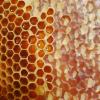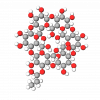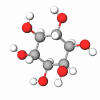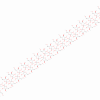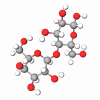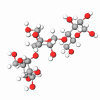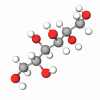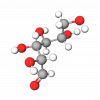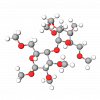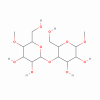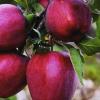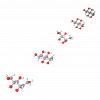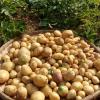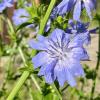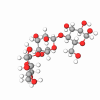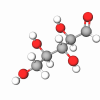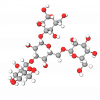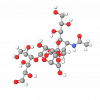Carbohydrates
This group is composed of highly effective skincare ingredients derived from diverse natural sources, including plants, grains, fungi, and yeast. The majority of carbohydrates incorporated into beauty formulas are glucans, long chains of glucose molecules that are linked together. Being derived from plants or microorganisms, these compounds are pretty familiar to our body cells, so they don’t cause any dermal irritation or sensitization. Some of the glucans are even utilized in the food industry. They are safe in concentrations used in cosmetics.
Glucans are a total win-win for all skin types. First, these carbohydrates are exceptional moisturizers. Applied to the top layer of the epidermis, they form a delicate layer on it and, thus, hinder water evaporation from the surface of the face. On the other hand, due to their chemical structure, they can bond with water molecules and retain them within the dermal layers. The double-moisturizing effect of these molecules protects the skin from dehydration, subsequent dermal destruction, and wrinkle formation.
Next, they are potent antioxidants and anti-inflammatory agents. These carbohydrates efficiently hunt and neutralize free radicals, which are the leading cause of collagen quantity drop and wrinkling. Actively penetrating the epidermis and dermis, they also halt the harmful cascade of inflammatory processes and prevent degradation of the skin's framework.
Additionally, these compounds are involved in inhibiting melanin production. In this way, they combat hyperpigmentation, one of the most common skin aging issues. And this is not the end. Some carbs are incorporated into beauty formulations to serve as prebiotics (food for dermal microflora). Microorganisms are an essential part of our body's uppermost layer, and their bioactivity directly affects skin integrity. This is why microbiome-friendly beauty formulas are one of the trends of 2021.Taking into account all these impressive benefits of polymeric carbs, many famous beauty experts mention glucans as must-have ingredients of result–delivering skincare products.
Hydrogenated Starch Hydrolysate is a modified poly-glucose matrix that is used to encapsulate active and non-active cosmetic ingredients. This method of encapsulation protects the components during vigorous heating allowing the products to be prepared as anhydrous powders.
Hydrolyzed Beta-Glucan is a mixture of oligosaccharides, a high-efficiency ingredient with a controlled molecular weight of between 1 and 15 kilodaltons. It is a colorless to pale yellow liquid composed of glucose and the somewhat rarer sugar talose.
Cyclodextrins are a well-known group of natural carbohydrates that, due to their novel cyclic structure, can act as the host in the host-guest complex.
Corn starch is a vegetable polymer used for decades in the food, pharmaceutical, and cosmetic industries. In its regular unmodified form, corn starch does not always provide desired technical properties and can therefore undergo modification or derivatization that shapes it according to needs.
Mannose is a simple monosaccharide sugar, a stereoisomer of glucose found in many plants and the human body. It plays an essential role in biological processes in the human body, particularly in protein glycosylation.
Cellulose derivatives have the polymeric backbone of cellulose, with repeating anhydroglucose units. After alkaline treatment, cellulose is reacted with methyl chloride to yield methyl ether groups. The end product is purified and ground to a fine powder and is known as methylcellulose.
Microcrystalline cellulose is purified, isolated colloidal crystalline cellulose derived from fibrous plants. It is a white, free-flowing powder that is odorless and insoluble in water.
Pectin is a general term describing a group of heteropolysaccharides abundant in plant cell membranes. Pectins are polymers of galacturonic acid sub-units and are acid-stable gel formers obtained by extraction from apple or citrus peels.
Potato Starch Modified is an off-white powder used as a thickener or emulsion stabilizer in skin care applications. It delivers a soft and velvety after-feel. The starch functions at low pH to provide stable viscosity and pH over time, both at ambient and accelerated aging conditions.
Propylene Glycol Alginate is an ester derivative of alginic acid (containing polymannuronate and polyguluronate esters) obtained from Laminaria or Macrocystis species of brown seaweeds after a series of purification steps.
The discovery of Rhizobian gum comes from agronomical research and the study of microorganisms living in the soil in symbiosis with plants. A specific microorganism identified as a Rhizobium bacterium lives in contact with the roots of sunflowers.
Schizophyllan is a natural polysaccharide derived from mushroom bio-fermentation. It is used in anti-aging, suncare, and products designed for mature skin.
Sialyllactoses are the core functional oligosaccharides in the mother’s milk. They protect an infant from external viral infection when its immune system is not fully developed. The oligosaccharides are known to have an anti-adhesion effect, so the virus cannot infect through cell membranes.
